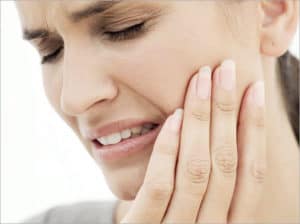Tooth pain can be an immense source of grief for most people. However, this typically indicates a bigger problem at hand, such as tooth decay or infection. In today’s blog post, we’ll talk about some of the primary causes of tooth pain and what you can do to stop it.
What Causes Tooth Pain?
The causes of tooth pain can vary from person to person and typically correlates with the severity of the issue.
If you are experiencing mild pain or discomfort, your the pain could be the result of something less severe than, say, a cavity or gum disease. However, it’s always important to visit a dentist as soon as you notice any sort of pain in your mouth.
Some primary causes of tooth pain include:
- Tooth decay- Tooth pain and sensitivity are oftentimes the first signs of tooth decay, which is better known as cavities. You may notice some pain when biting into food or discomfort when consuming hot or cold foods. When a cavity is left untreated for an extended period of time, it can cause the pulp of the tooth to become infected, which will require a root canal. If you think you may have a cavity, you should make a dentist appointment as soon as possible.
- Dental procedures- Some pain or sensitivity is common after certain dental procedures, such as cavity filling pain, wisdom teeth removal or root canals. However, it is important to keep in mind that these procedures, especially fillings and root canals, ultimately alleviate the more intense pain and health risks that stem from tooth decay or infection.
- Braces- Braces or other orthodontic treatment can cause some discomfort and pain, especially during the first few weeks of wearing. This should eventually subside.
- Gum disease- In the early stages (gingivitis), gum disease typically manifests itself through bleeding or swollen gums, which can cause pain while eating or brushing. As gum disease progresses into periodontitis, the gums loosen around the teeth and can ultimately lead to tooth loss.
- Injury– A chipped or dislodged tooth is often accompanied by some sort of pain, ranging from mild discomfort to intense pain depending on the severity of the injury.
- Bruxism– Bruxism is the fancy term for grinding teeth. If you find yourself grinding your teeth at night or clenching your jaw throughout the day, there may be a correlation to tooth pain. While most cases of bruxism are mild, grinding teeth can cause the enamel to eventually weaken. If you suspect you have bruxism, you may want to consider wearing a mouthguard at night to protect your teeth.
How to Stop Tooth Pain
Just as the causes of tooth pain vary, so too do their remedies. However, the first and most important thing you should do before pursuing any sort of treatment is to call your dentist. He or she can properly examine your mouth for signs of infection or trauma and administer treatment accordingly.
Mild Pain
For mild pain and discomfort, taking an over-the-counter pain reliever such as ibuprofen or naproxen can help alleviate your symptoms. You may also want to opt for a benzocaine-based topical anesthetic gel to reduce tooth pain.
In addition, you may want to avoid certain foods, such as hard or crunchy foods or very hot/cold dishes, if you notice a correlation between eating and tooth pain. Home remedies, such as swishing salt water in the mouth, may also help cleanse the mouth and provide temporary relief, especially in cases of infection.
For those who experience bruxism, an over-the-counter pain medication can help relieve any sort of mild pain. Your doctor may also prescribe a muscle relaxant if your bruxism is more severe.
Intense Pain
For pain that’s incurred after surgery or another type of dental procedure, your doctor may prescribe you a stronger medication to cope with the pain. If you have an infection of any kind, your dentist may also prescribe an antibiotic to kill bacteria and prevent the infection from spreading.
If you are experiencing tooth pain and are not sure what is causing it, seek help from a dental professional as soon as possible. Again, your pain could be the sign of something serious like tooth decay, infection or even oral cancer, and merely masking the pain will not do anything to treat the issue in the long term. Additionally, keeping up with regular brushing and flossing will keep your teeth and gums as healthy as possible and prevent tooth pain from occurring in the future.

